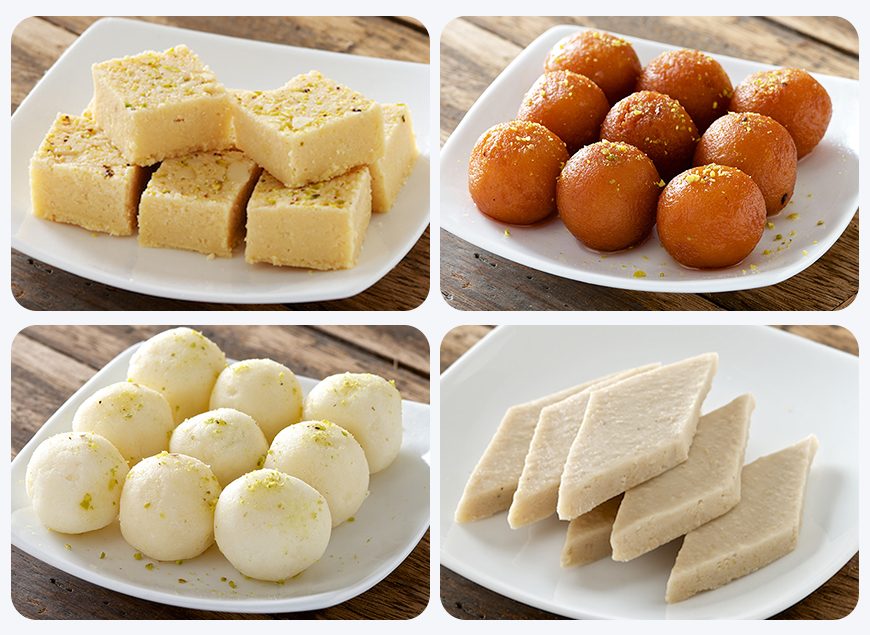Indian tradition & culture strongly promotes the purity of food. People first offer a part of their cuisine to the Gods and deities and then consume it or offer it to the guests. Food is prepared with love, care, and devotion. Indian sweets have special importance in traditional celebrations, and ghee, sugar, and milk are the main ingredients in the making. All these ingredients are pure. Let’s discover how sweets are important in Indian tradition and how they make everything auspicious.
Indian sweets have had a long and rich history since ancient times. In earlier references, Indians used to prepare sweet dishes with honey and fruits or dry fruits. Later, sugar and milk were used to prepare delicious sweets during the festive season.
Sweets and desserts were widely enjoyed by royalty and common people alike, and since then, they have become an integral part of the Indian tradition.
Different states in India have unique varieties of sweets, using easily available ingredients and cooking methods. Modern Indian sweets are renovated with different mixes, keeping the base ingredients intact. And today, these sweets have traveled across the world and enjoyed by millions.
Indian sweets and their importance in traditional celebrations
Every Indian festival has a sweet at the core of its celebration. India has many festivals celebrated with great enthusiasm, including Diwali, Holi, Baisakhi, Raksha Bandhan, Janmashtami, Ganesh Chaturthi, Navratri, and Dussehra. A lot of sweets are enjoyed and shared during these festivities.
Every sweet represents a tradition. From the melt-in-your-mouth Gulab Jamun to the delectable Rasgula, these dishes add a touch of sweetness to the occasion and bring people together. During Diwali, families exchange boxes of sweets as a symbol of sharing happiness and love. Similarly, during Holi, the festival of colors, people enjoy a variety of sweets, including Jalebi, Gulab Jamun, and Burfi.
Sweet delicacies satisfy our taste buds and reflect the rich traditions and values of Indian culture. In essence, Indian sweets embody the warmth, love, and togetherness that define the spirit of festivals.
Let’s discover top Indian sweets that truly reflect Indian tradition.

Burfi
Indian Burfi holds immense significance in Indian tradition, especially during festivals and celebrations. Made with condensed milk, sugar, and various flavorings such as cardamom, saffron, and pistachios, it is known for its rich and creamy texture and its mouth-watering taste. Burfi is often exchanged between friends and family during auspicious occasions and is considered a symbol of love and affection. At Rajbhog Foods, we have 11 varieties of such tasty burfis you can enjoy at home by ordering from our website.

Gulab Jamun
Golden brown fried khoya balls covered with sugar syrup, Gulab Jamun is an irresistible sweet delicacy during Indian celebrations. They are often served warm and garnished with pistachios and saffron. Gulab Jamun symbolizes sweetness, love, and happiness, making it popular during weddings and festivals like Diwali and Holi.

Rasgula
Originating from Eastern India, Rasgula is a soft, spongy white ball made of chenna (milk solids) and dipped in sugar syrup. Rasgula has a deep significance in Indian food culture and is offered to the Gods during religious ceremonies as prasad. It is also a popular sweet for celebrations like Holi and Durga Puja.

Kaju Katli
Kaju Katli is a diamond-shaped sweet made of cashew nuts, sugar, and ghee. This luxurious sweet has a rich, creamy texture and is often garnished with silver leaf. Kaju Katli is a popular choice for gifting during festivals like Diwali, as it symbolizes prosperity and wealth.
All these sweet dishes mentioned here are incredibly healthy for your body. You can also gift them to your loved ones.
Try these Indian dry fruit sweets this winter, and forget the winter blues!
You get wholesome and authentic flavors of Indian dishes and the right warmth you deserve.
So, what are you waiting for? Click here to find all the authentic Indian dry fruit sweets to warm your body and heart!







